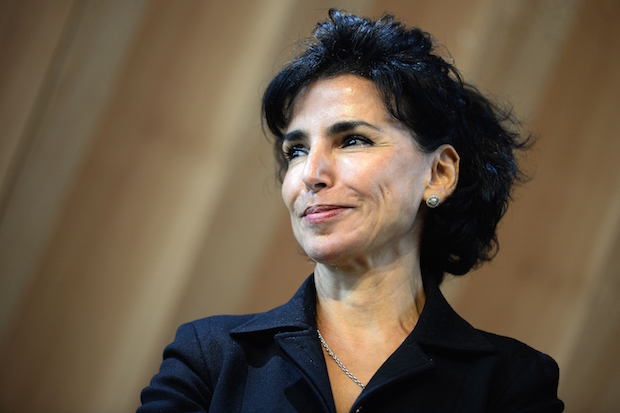The last time former French Justice Minister and MEP Rachida Dati had the attention of the British press she was embroiled in a combination of sex, politics and intrigue as only the French establishment could concoct. Now she’s back as an unlikely, but potentially vital, centrepiece to the Conservative leadership’s plan to keep Britain in Europe.
‘David Cameron has been brave in basically saying: we want the British people to feel comfortable in the EU, but we want them to have a “better deal”‘ Dati opines. We’re sat in the grandly gothic surroundings of London’s St Pancras station, and the last staging post en-route back to Brussels feels a suitable place to discuss Britain’s place in Europe. ‘It’s been clear for quite some time now that the British people want a referendum on the UK’s place in the EU. David Cameron has done the right thing in answering these aspirations.’
This must be music to Cameron’s ears, who last week admitted he’s not been greeted by a ‘wall of love’ in Europe since his re-election, and is presumably something she’s urged in person in her increasingly frequent London visits. She’s met with Cameron and his team on several occasions, and could be said to be courting the Conservative leadership. On whose orders? Well, Rachida Dati is the closest political ally of former French President Nicolas Sarkozy, who is widely predicted to be on course to return to the Élysées Palace in 2017.
Of Sarko, ‘we’re now working on building a new party, preparing for regional elections at the end of the year’, the party, Les Republicains (a none-too-subtle nod to fellow conservatives across the Atlantic), will be officially adopted by their party, the UMP, this week, and is a key stepping stone to success in the 2017 presidential elections.
2017 is a significant year for Cameron, too, as this is the likely date for his European in/out referendum. By this point he expects to be waist-deep in negotiations on British opt-outs to support his stated ‘better together’ position, and it is hoped that fellow conservative Sarkozy might be able to gain the British government some much needed traction in Europe at the key moment.
And will Europe listen? ‘I believe the UK needs to stay in Europe, but like David Cameron, I believe that the EU cannot ignore the frustrations of one of its largest and most powerful Member States’. Maybe, with her backing, they will.
It’s the sort of struggle that excites her, and one which personifies Dati’s career, which has seen her overcome particularly long odds to become one of France’s most powerful politicians.
She splits her time between the European Parliament and Paris, where she is mayor of the Seventh District. Boris Johnson, who is emulating her by concurrently sitting in both Westminster and County Hall, will surely welcome her philosophy: ‘I think that being able to represent people on a local and on a national level is politics at its most effective’.
Her ‘locals’ include some of France’s most aristocratic families, as well as fashion royalty Karl Lagerfeld, Kenzo and Delphine Arnaut. ‘The 7th’ is one of the most exclusive of Paris’s arrondissements and she loves to boast that it includes the Eiffel Tower.
In the hotel lobby, Dati looks every bit the equal of her glamorous Parisian constituents, dressed in expensive jeans and blazer, wearing Audrey Hepburn style dark glasses. Her now six-year-old daughter, the subject of so much speculation a few years ago, interrupts us and it’s clear that Dati is the devoted mother her political opponents lined up to tell the press she wasn’t, when she refused to breastfeed and returned to work so soon after giving birth. After answering some childish questions and tenderly feigning interest in a Pikachu toy, she bursts into giggles ‘I’m so sorry, now all that’s on your tape!’. It’s a moment of humanity in a women known for her steely exterior, and it’s a reminder of how different her daughter’s upbringing, only child to a powerful mother in the Mayfair of Paris, will be compared to her own.
One of the eleven children of a Moroccan builder and Algerian mother, Dati comes from a ‘very working class background’, explaining ‘I’ve been working full-time since I was 16 and a half. I had to work to study’.
She is, in fact, the first ever senior Minister to have come from a North African background, but doesn’t like talking about it. When I mention her unconventional career and profile, compared to the posh boys club of French politics, she repeatedly pretends to misunderstand the question. Perhaps she’s embarrassed, but given how impenetrable the French establishment normally is, she shouldn’t be. In a system where over fifty percent of the current cabinet attended one political finishing school, the exclusive Ecole Nationale d’Administration (Ena), and almost all went to one of the small number of similar ‘Grand Ecoles’, it seems that Dati is a determined outsider somehow at the heart of politics.
But perhaps it’s her place at the heart of British politics which will surprise many this side of la Manche, and it looks like her Downing Street visits will be more and more frequent. Not that her admiration is reserved solely for David Cameron; she lists one of her political heroes as ‘clunking fist’ Gordon Brown ‘I think Gordon Brown is a fascinating, complex character. I think he was outdone by his complexity’.
But it’s Cameron who’s currently in favour, though she will need to be re-elected before she can offer materiel support. As she gathers her things to leave, she is upbeat on their chances of returning to government ‘I am optimistic. But in politics, only work matters. But I’m still optimistic’. And in a whirl of coats, suitcase and Hamley’s bags, she’s gone to write her report, plot a return to government and Britain’s place in Europe. And to play Pokemon with her daughter.






Comments